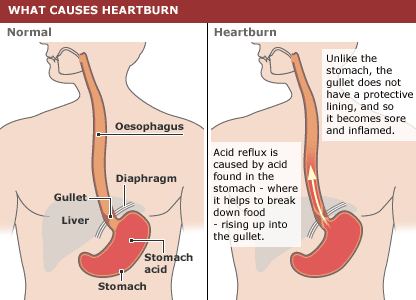While antacids may quench the fire of heartburn temporarily, they can cause side effects if used regularly. The best way to douse the fire is to practice prevention. Your esophagus is protected from acid splash-back by a valve called the lower esophageal sphincter or LES, but sometimes your LES goes to sleep on the job. It relaxes and allows stomach contents to sneak past it into your unprotected esophagus. Anything that may put pressure on this valve or cause it to relax may set you up to get burned by heartburn.
Here are some things you can do to keep your lower esophageal sphincter in good shape:
- Kick the habit. A cigarette is a double-edged sword as far as GERD is concerned. The smoke causes a temporary reduction in the strength of the esophageal valve, and the nicotine increases your production of stomach acid. Remember, the next time you light up, you may also be lighting a painful fire in your chest.

- Avoid food triggers. Certain foods are more likely to trigger an attack of heartburn, probably because they cause your LES to relax. Although different people have different triggers, some of the more common ones include chocolate, peppermint, spearmint, caffeine, tomatoes, citrus juices, and spicy foods. You can keep a food diary to help you identify the foods that give you heartburn.
- Eat small meals. Large meals seem to bring on heartburn more than light meals. You may be better off eating six small meals throughout the day instead of eating three large meals.
- Stand up straight. You knew there was a reason your mother chastised you for your posture. Bending or stooping after meals can force food and stomach acid into your esophagus, setting off the fire of heartburn. For the same reason, you should avoid eating right before going to bed.
- Keep it slim. Excess weight may increase pressure in your abdominal area, which can make food more likely to back up into your esophagus.
- Let it all hang out. Though you may be tempted to tuck those excess pounds into a girdle or tight-fitting jeans, you may pay a price for your vanity. Just like that extra fat, the pressure from tight clothing can force food upward. Loosen your belt a notch or two and wear loose, comfortable clothing.
- Raise your head. You should raise the head of your bed so your head is higher than your stomach. Most heartburn occurs at night, while you are lying down. If you put a 6-inch block under the head of your bed, or under your box spring, you will have the force of gravity on your side. Stomach acid will be much less likely to back up into your esophagus, and you can get a good night’s sleep.Try to remain regular. Straining to have a bowel movement can make your reflux worse. Exercises like sit-ups and leg lifts may also cause additional strain.

- Avoid aspirin and alcohol. Alcohol and aspirin can aggravate your reflux, so limit your intake of alcohol and use a pain reliever containing acetaminophen, like Tylenol, instead of aspirin.
- Check your medicine cabinet. Many prescription drugs can cause heartburn. Some of the most common include Bentyl and Librax, which are used to treat intestinal spasms, and Inderal, Lopressor, Cardizem, Calan, and Verapamil, which are used to treat high blood pressure and angina. Ask your doctor or pharmacist if your heartburn could be caused by the medicine you are taking.
Treatment for persistent heartburn
If you have an occasional flare-up of heartburn, you probably reach for an antacid for quick relief, but did you know long-term use of antacids may cause side effects?
Don’t despair. New, over-the-counter medicine is available to treat acid reflux, check here. The first to be introduced was Tagamet (cimetidine), and it was followed by Zantac (ranitidine), Pepcid (famotidine), and Axid (nizatidine). These drugs decrease the amount of acid your stomach produces. You take them once or twice a day, instead of constantly chewing an antacid tablet. If all else fails, see your doctor. He can prescribe medicine that will extinguish the fire.